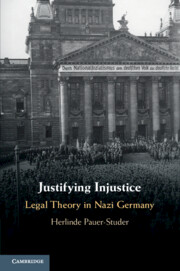
-
Select format
-
- Publisher:
- Cambridge University Press
- Publication date:
- September 2020
- September 2020
- ISBN:
- 9781316671412
- 9781107159303
- 9781316612163
- Dimensions:
- (228 x 152 mm)
- Weight & Pages:
- 0.55kg, 282 Pages
- Dimensions:
- (229 x 152 mm)
- Weight & Pages:
- 0.382kg, 282 Pages
You may already have access via personal or institutional login
Book description
Post-war legal scholars commonly consider the Third Reich's judicial system to be the paradigm of 'evil law'. By examining how crucial parts of this distorted normative order evolved and were justified by regime-loyal legal theorists, we can appreciate how law can bend to a political ideology and fail to keep state power from transgressing elementary standards of humanity and the rule of law. From 1933 to 1939, a flood of publications reflected on the question of how to adapt law to the political ends of National Socialism, debating both the normative and constitutional foundations of the National Socialist state, and the proper form and content of criminal and police law in this new political framework. These debates, the main threads of which are central to this book, reveal the normative ideas driving the Führer state and the legal subtext to the Nazi regime's escalating atrocities.
Reviews
'At long last, we have a reliable primer on Nazi law. Justifying Injustice provides a terrific introduction to the theory and history of authoritarian legalism in a much-misunderstood case. To say that the law of the 'Third Reich' was morally odious, insists Pauer-Studer, is not enough. Far more important is reconstructing the socio-legal context in which the norms and institutions of Nazi law were invented, weaponized, and wielded. With tact and care, Pauer-Studer offer just such a reconstruction. She faults legal positivists and natural lawyers for their shared inability to come to terms with the really existing practices of Nazi legality. Although written from the perspective of legal theory, Justifying Injustice allows us to see the violence of law at the point of its application, thereby illuminating brightly the legal origins of Nazi dictatorship.'
Jens Meierhenrich - Director of the Centre of International Studies at the London School of Economics and Political Science
Contents
Metrics
Altmetric attention score
Full text views
Full text views help Loading metrics...
Loading metrics...
* Views captured on Cambridge Core between #date#. This data will be updated every 24 hours.
Usage data cannot currently be displayed.
Accessibility standard: Unknown
Why this information is here
This section outlines the accessibility features of this content - including support for screen readers, full keyboard navigation and high-contrast display options. This may not be relevant for you.
Accessibility Information
Accessibility compliance for the PDF of this book is currently unknown and may be updated in the future.


